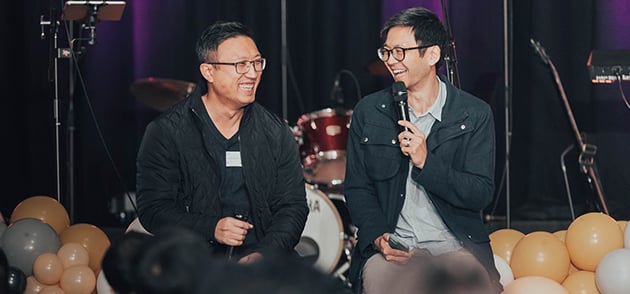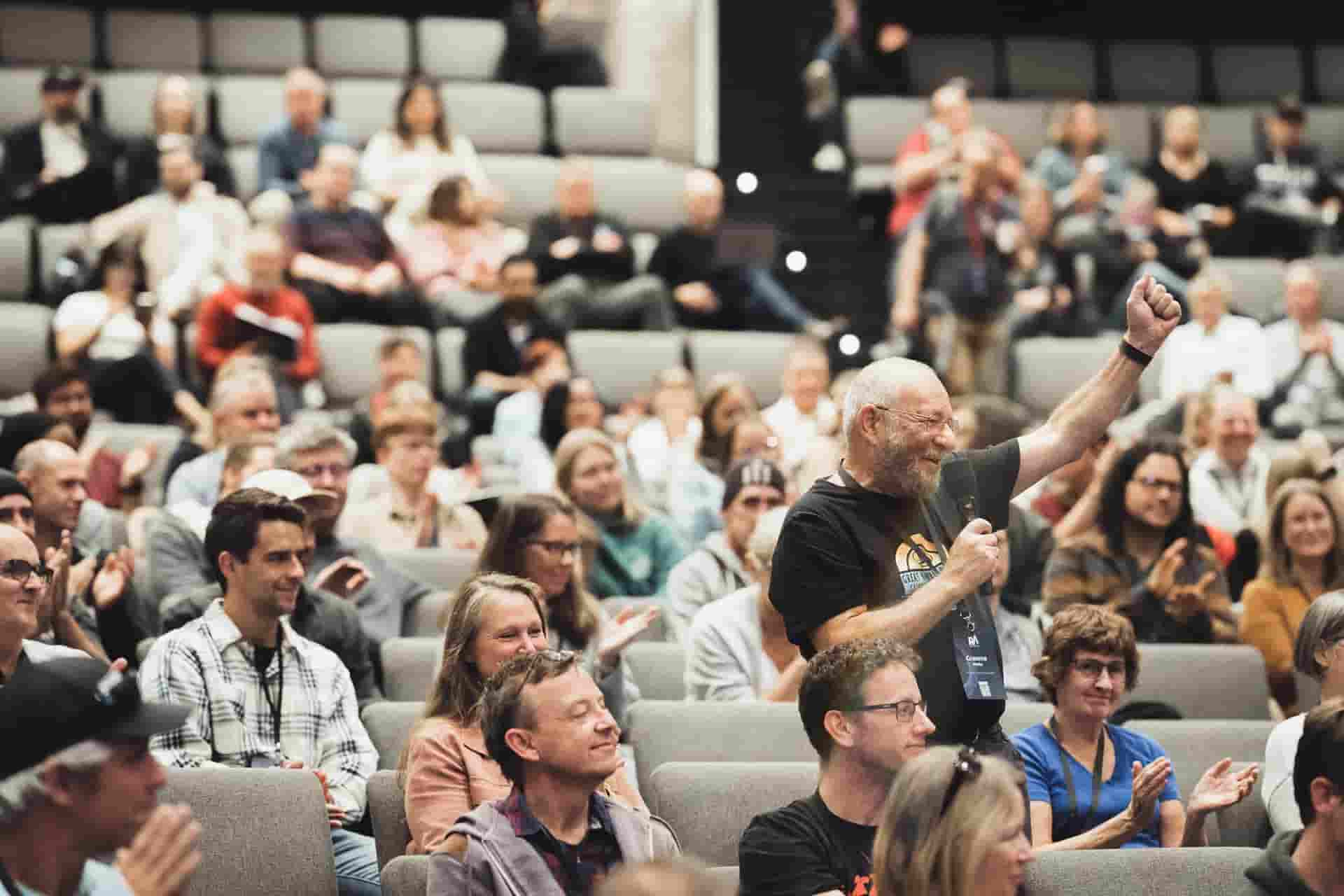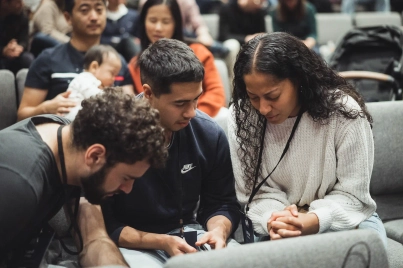There is caring for people who are in need and there is disciple making. But do these things need to be at odds?
Sally Sims is the Care Ministry Coordinator at Christ Church, St Ives, on Sydney’s North Shore. She’s author of Together Through the Storm A Practical Guide to Christian Care and she sits down with Jo Gibbs to talk about how pastoral care can be disciple making.
SHOW NOTES:
Sally’s book can be found here. Watch for the 2nd Edition in August.
Care resource list from the Reach Australia National Conference
Disciple Making Pastoral Care by Sally Sims
Disciple Making Pastoral Care within Small Groups by Sarie King
Keep watching for more Reach Australia Resources
CREDITS:
The One Thing is brought to you by Reach Australia.
For ideas or questions please email [email protected]
To support the Reach Australia Online Library head here.
TRANSCRIPT:
Jo
G’day. I’m Jo Gibbs, and welcome to The One Thing, a podcast designed to give you one solid practical tip for gospel centered ministry every week, the one things brought to you thanks to reach Australia, we love to say thousands of healthy, evangelistic and multiplying churches right across Australia. At our recent national conference we pushed into the area of care and we’re continuing that conversation today with Sally Sims, the care ministry coordinator at Christchurch St Ives. And if you haven’t listened to it already, I encourage you to go back and take a listen to our previous episode where we talk about if you’re feeling overwhelmed about care needs at your church, what can you do about it? Well, Sally, welcome back to the One Thing.
Sally
Thanks for having me again.
Jo
Great to have you here. Now, this was your first time at national conference, is that right?
Yeah.
Okay. So you’re a newbie. You’ve got fresh eyes on national conference. What was something that really encouraged or challenged you that you took away from conference this year?
Sally
It was so encouraging to be at the Reach National Conference with over a thousand leaders there. It was lovely to see everybody connecting and listening to God’s Word and encouraging one another. But the most exciting thing for me was that there was a whole day that was dedicated to care. We had two plenary sessions, followed by some workshops and we had some great conversations. People were talking about how could we improve care at our church? So for me that was the highlight.
Jo
Yeah, and agree with you because often it’s an optional workshop at a conference, but to have everyone in together pushing into this area was fantastic. Well, for now, you’ve press play on another episode of The One Thing is Care ministry, real gospel Ministry.
Well, we’ve been talking in our previous episode and today about the whole area of care in our churches, and it’s part of church life, but it’s also part of living in a fallen world that we experience things like conflicts and sickness and disability and death and all different kinds of suffering.
Now it’s church leaders who know and love Jesus. Our whole focus in ministry is to be making mature disciples in ever increasing numbers. And we talk about this all the time at Reach Australia, and it’s the lens that we use to kind of look across all of our ministry and shape our priorities and how we spend our time.
But often caring for people can feel like it’s in competition. With that focus, we can feel like we should be doing evangelism rather than providing a meal for someone. Being strategic and proactive rather than responding or reacting to care needs that come across our desk and we want to keep a really good focus on the gospel. So does that mean we should be doing no pastoral care or as little as possible?
Sally, why do you think we often feel like these two areas of ministry are in competition with each other?
Sally
It is a good question, Joe, and I think that they can feel like they’re in competition. When we lose sight of the great commandment, Jesus has given us two important tasks. Firstly, the great commandment to love God and love people, and secondly, the Great Commission to go make disciples and teach them to obey everything Jesus has commanded. And it’s a mistake, I think, to focus on one at the expense of the other.
It’s not either or, It’s both. And and if we love God and we love our neighbor, then our love for God is going to be expressed as having compassion for the last and sharing the gospel. And as we share the gospel, we’ll want to do that in a caring, respectful way. And we’ll also want to express our love for God and others by having compassion on those who are in need.
And we want to support them as a whole person. But most importantly, we’ll want to love them by listening well and sensitively offering prayer and gospel encouragement. And the other important thing to remember is that if we are sharing the gospel and hopefully we are and our churches are growing, then people will be bringing their real lives with them, you know, And if they’re new Christians, they’re going to have questions.
They’re going to want to know what’s the link between sin and sickness? And can I really trust God in the midst of suffering? So we need to be ready to care for them.
Jo
Yeah, I love that. Yeah. As people coming to our churches, they do have real lives with them and we can’t separate that from their spiritual growth. It’s all actually connected up. Really helpful. Sally I guess it also depends on what our definition of carries and you see different versions of that around the place. How would you define what care is?
Sally
That’s really important. We do need to be clear on what Christian care is. It’s gospel shaped care, and I suppose we could define it as saying it’s loving one another by supporting the whole person and encouraging faith, growth and perseverance in Jesus.
Jo
Can you unpack that a little bit?
Sally
Yeah, well, we need to keep the whole person in view because people have psychological, emotional, physical, social and spiritual needs. Yeah. So we’ll want to address the whole person, but we don’t want to leave out the spiritual component because care without the gospel is just social work is not Christian care. Every day we all face temptations to move away from Jesus.
Sally
And this is especially the case when we’re suffering or when times are difficult. And so we need to be reminding one another of God’s character, His love, his promises. We need to be praying for and with one another.
Jo
Yeah, And it’s great in the definition that you can say where everyone, wherever anyone is on that spectrum of coming to know Jesus, that as they’re going through suffering our care can help them keep growing and Jesus will come to know Jesus or, as you said, persevere when things are hard, when they remember God’s truths in his promises.
Yeah. So, Sally, as we’re thinking about helping people to grow as disciples of Jesus through our care, what sort of things should we be paying attention to?
Sally
Well, I think we need to be intentional about care, Joe. There’s lots of spontaneous care that goes on in the church, and that’s great. But we also need to have care on our agenda, and we need to know that care is an integral part of every ministry area, whether it’s mission maturity, membership, church can be thought of, can’t it?
Like a pathway that people are walking along so they’re welcomed and then they join the church. They hopefully join a growth group and then they begin serving. And the thing that we know is that people actually won’t stay in a church if they don’t feel loved and cared for. Yeah, we need that loving church for not only Christians, but non-Christians who are going to join us so that they’ll stay and so that they’ll grow.
So I think collaboration between care and the other ministry purposes is important. And in fact, next Thursday we’re holding a pre evangelistic event, which is a collaboration between care and mission at our church. And we’ve invited Kristin Pallone to come and talk about depression and anxiety and the difference Jesus makes. So it’s pre evangelistic. We hope people will bring along a friend and we hope to that they will see that we truly are a church that cares for people who are struggling with mental ill health and that they’ll want to know more.
Jo
Yeah, and great to hear that collaboration between different ministry areas as we work within the ecosystem together. Yeah, that it’s not just silos but how we do care together. How about things like growth groups?
Sally
Yeah, well, growth groups are of course key. You know, as we meet around God’s Word, we’re praying that God’s Word will change us and that we will be applying that world word in our everyday life. And that means loving one another. It’s no good being deep in the word if we’re not loving one another. We know that knowledge just puffs us up.
Sally
So caring is one another ministry and everybody’s responsible for care. And so, you know, growth groups are an important part of that. We also need to hear God’s Word taught well to us on this topic so that we can be really encouraging one another to be growing as whole hearted disciples and most importantly, we always need to remember that care starts and ends with God.
Sally
You know, we model it on Jesus. So we need to be praying for his help, his help to equip us, his help to grow us and his help to be growing disciples. Yeah, we need to remember, too, that God’s already present in whatever situation that we’re in with with an individual, and that any difference we’re actually making, that’s only possible because Jesus loved us first.
Jo
Yeah, that’s really helpful. As I’m listening to you and we’re talking about disciple making care, I guess one of the dangers, I might say, is that someone might listen and think, okay, so when I do a pastoral visit with everyone, I should pull out to waste, to leave, you know, because we’re bringing that growth in Jesus or in our evangelism together with care. Is that how I should be thinking?
Sally
No. I think it’s good to have two ways to live in your handbag. But, Jo, we need to not come with our own agenda. We really need to listen well. We need to work out where people are at. That means take time to listen, ask questions, be curious, find out where they’re at, what do they understand by the Christian faith?
Sally
And we always want to speak gently into that space. Well, it might be that it’s appropriate to bring out two ways to live, if that’s where the person’s at, or it might be more appropriate to go to certain passages in the Bible with them, or just to speak about God’s character, his promises, or to share something that you’ve been reading this morning that can be very encouraging to Ted never loses sight of the big goal of disciple making.
Sally
Jo, but we always need to be gentle. We always need to be sensitive, and actually we need to ask for permission from the person. Is it okay if I pray with you? Is it okay if we open the Bible? We don’t come with our own agenda and we need to be sensitive because, for example, in grief, it’s not caring to rush somebody on to the silver lining.
Sally
We need to sit in the shade with them. We need to let them express their grief. We don’t want to be like one of Joe’s comforters and saying trite things.
Jo
Yeah. And I guess also what we’re hearing is encouragement from you that when someone’s in the middle of suffering, not to step back from sharing the gospel where it’s appropriate, because that’s, that’s sometimes our danger. Yeah. But to do that gently and appropriately know where the individual person’s at, take that time to listen and understand the context and have real love and concern for them to.
Sally
Read and prayerfully to know and pray before you go to visit somebody, whether it’s in the car before you step out as you’re walking up the pathway, always praying, committed to God.
Jo
Yeah. This has been so helpful. Sally. One of the things I’ve really noticed is as I’ve spent time with you, as we’ve had lots of conversations, as we’ve tried together over the years, you have such a deep grounding in the gospel comes out in as you talk about ministry, as you pray with people. This is this is absolutely foundational to your ministry.
Jo
We also see that often in the case of Mercy Ministries or ministries of care, sometimes they lose that focus. What’s been the real difference for you? What has helped you to keep that that foundation in Jesus and Kate focused on the gospel?
Sally
Good question. Yeah. And I think it’s that I’ve been so blessed with good teaching faithful, good teaching over the years that has really helped me to grow in my love and knowledge of Jesus. I’ve also been part of a growth group for many, many years now, and that’s been just life changing. But also I think my own personal experiences of going through suffering and difficulty, you know, when you’re in the furnace, it’s then when Jesus does his work on your heart and on your mind and you really realize how much you do need him and how how you learn that process of trusting him with all your heart.
Sally
Also the privilege of walking alongside other people I’ve seen, you know, prayers answered. It’s always a two way process when you’re caring for someone else. It is the one another thing, you know, you go to be a blessing to someone. And more often than not, they’re a blessing to me. So seeing prayers answered, seeing the difference Jesus makes in those people’s life, and it might be I’ve had the privilege of people seeing Jesus, people accept Jesus before they die, You know, these kind of things are life changing.
Sally
Yeah, I’m tempted to move away from Jesus. You know, every day there are other voices calling me. But as I get older, I can. I God’s open my heart and mind and eyes to see. These are things not really worth chasing after. So I’m so thankful for that and that every day, you know, committing myself to Jesus, reading his word is the thing that has kept him at the center of my life.
Jo
Yeah, that’s. I say, Yeah, that’s grace. So encouraging. Well, Sally, as we wrap up, what’s the one thing you want to say about care? Ministry and disciple making is care real gospel ministry.
Sally
It is, Jo. And I think caring for people and disciple, making must go hand in hand, because truly the forgiveness of sins and a growing, persevering relationship with Jesus are ultimately so much more important than freedom from trouble in this life. Yeah.
Jo
Thanks. Well, in our toolbox today, we’ve got a few really helpful resources. A reminder again to go back and listen to the last episode with Sally as we looked at what you can do about feeling overwhelmed about care needs at your church, we’ll have the care resource list from national conference and a link to Sally’s book together through the storm.
Jo
We’re also going to add to additional resources. There are two papers from Sally Sims and Sara King from the Effective Ministry website on disciple making Care. Well, if you’ve got a topic you’d like us to cover on the one thing, please email us at Resources at Reach Australia dot com dot AEW. Sally, thanks so much for sharing your time, sharing all that you’ve learned about Care ministry with us.
Sally
Thanks, Jo. It’s been an absolute pleasure to be here.
Jo
I’m Joe Gibbs, Chat soon.
Speaker 3
With this podcast is part of the Reach Australia Resource Library is your toolbox of biblical and practical wisdom from gospel workers. We want to equip you to reach more people for Christ. It started as a drop box and now contains over 4000 podcasts and ebooks, and it’s free that anyone to use. It’s all possible because someone like you was generous and it only continues because God uses people like you. Will you give $20 today to keep sharing resources like this? Click the link in the show notes. We thank God for generous people like you.



